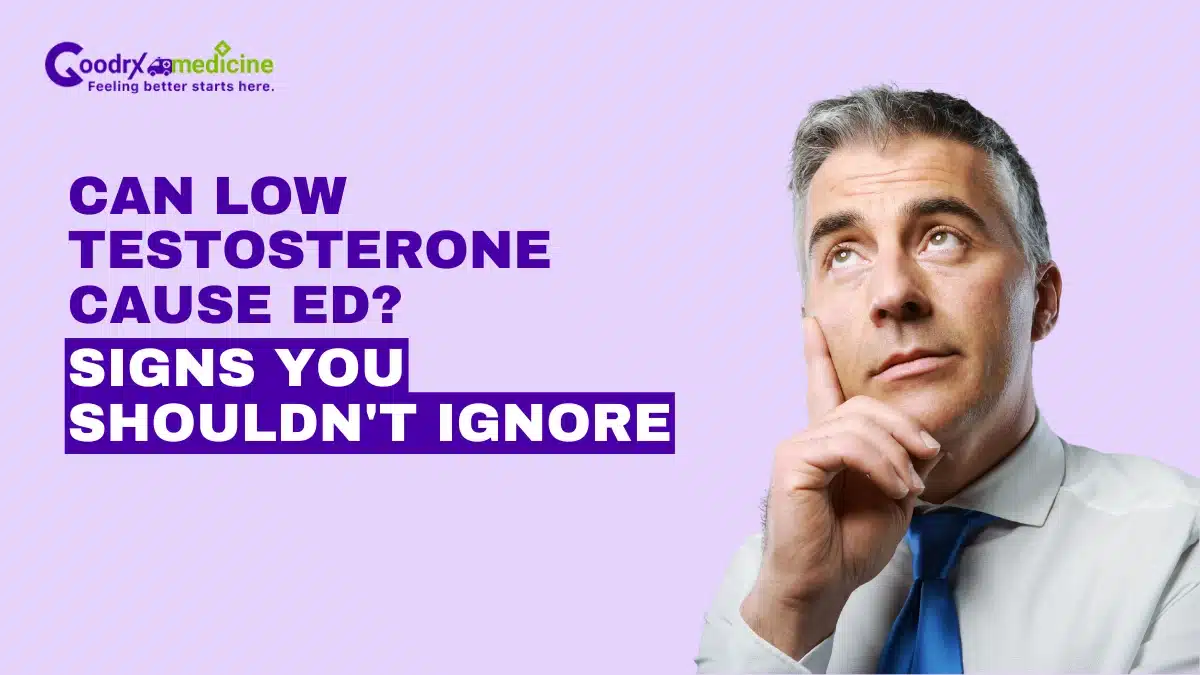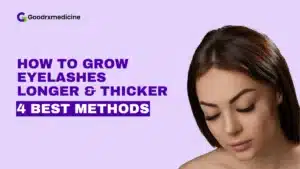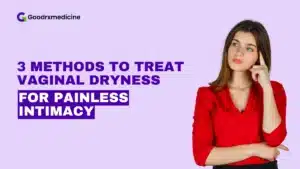Can Low Testosterone cause ED? It’s a question many men face as they experience changes in sexual health with age.
Testosterone is essential for libido, mood, and energy, but its link to erectile function is more complex than most think. While low T may not directly cause Erectile Dysfunction or ED, it can reduce sexual desire, worsen other health conditions, and make achieving erections more difficult.
Understanding this connection is key to finding effective solutions. In this article, we will break down how Low Testosterone affects sexual performance, what other factors are involved, and the best steps to address both. So, read on to learn more.
Does Low Testosterone cause Erectile Dysfunction?
Yes, but the answer is complex. Research shows that approximately one-third of men with Erectile Dysfunction also have Low Testosterone, but this doesn’t mean Low Testosterone directly causes erectile problems.
Low Testosterone and Erectile Dysfunction are separate medical conditions. Low Testosterone affects about 2% of men overall, with higher rates among those over 50. Many men with reduced Testosterone maintain normal erectile function, while others with normal hormone levels experience ED.
The primary connection lies in how Testosterone affects sexual desire rather than the physical mechanics of erections. When Testosterone drops, men often lose interest in sexual activity, which can indirectly impact their ability to achieve erections during intimate moments.
Save up to 90% on your medicine bills

YourHappy Shilajit Gummies

Leeford Shilajit Tablets

Rasayanam Pure Shilajit Resin

Kapiva Shilajit Gold Resin
How does Low Testosterone contribute to Erectile Dysfunction?
Low Testosterone levels impact sexual function through multiple interconnected pathways, affecting both the mind and body, which together increase the risk of ED, including:
- Reduced sexual desire: Low Testosterone primarily affects libido, making men less interested in sexual activity and reducing the mental arousal needed for erections.
- Secondary health effects: Hormonal imbalances can lead to weight gain and cardiovascular changes, which reduce blood flow to the penis and affect erection quality.
- Psychological impact: Low Testosterone often triggers stress, Depression, and Anxiety, all of which interfere with sexual performance and satisfaction.
- Physical complications: Testosterone deficiency can contribute to Obesity, Diabetes, and other chronic conditions that directly impair erectile function.
Other factors that worsen the connection
Several underlying conditions can make the relationship between Low Testosterone and Erectile Dysfunction more complex:
- Diabetes and cardiovascular disease: These affect both hormone production and blood vessel function, simultaneously lowering Testosterone levels and impairing blood flow necessary for erections.
- Obesity and metabolic syndrome: These create a cycle where Low Testosterone promotes weight gain, and excess weight further reduces Testosterone production.
- Sleep disorders, particularly Sleep Apnea: It disrupts hormone production cycles and reduce oxygen delivery throughout the body, affecting Testosterone synthesis and erectile function.
- Age-related changes: Testosterone levels decrease in men as they age, and this decline is often accompanied by reduced nerve sensitivity, less elastic blood vessels, and a higher risk of chronic diseases.
When to seek medical advice
Certain warning signs suggest you should consult a healthcare provider about potential Testosterone and erectile function issues:
- Persistent erectile difficulties combined with other symptoms: Fatigue, mood changes, reduced muscle mass, or decreased sexual desire that continue despite lifestyle adjustments.
- Sudden changes in sexual function or interest: A rapid decline in sexual performance or desire that significantly impacts your quality of life.
- Multiple symptoms occurring together: This may indicate underlying health conditions requiring targeted treatments and should not be ignored.
- Complete Erectile Dysfunction developing suddenly: Could be a sign of serious cardiovascular problems needing immediate medical attention.
Remember that healthcare providers evaluate Testosterone deficiency and Erectile Dysfunction as separate conditions. Medical experts emphasize that treating Testosterone levels alone typically doesn’t resolve erectile problems, so a comprehensive evaluation is essential.
Conclusion
Can low Testosterone cause ED? Yes, but through indirect mechanisms rather than direct causation. Low Testosterone can indirectly contribute by lowering sexual desire, reducing mental arousal, and impacting energy and mood.
Additionally, it can worsen secondary health conditions such as obesity, Diabetes, cardiovascular problems, and psychological stress, all of which further interfere with erectile function. ED and Low Testosterone are separate medical issues; addressing one alone may not resolve the other.
Men experiencing persistent erectile difficulties or symptoms of low T should seek professional medical evaluation to identify underlying causes and receive comprehensive treatment, ensuring both hormone balance and sexual health are appropriately managed.

Frequently Asked Questions
What Testosterone level indicates increased ED risk?
Testosterone levels below 300 ng/dL (nanograms per deciliter) are generally considered low, but ED risk depends more on symptoms, age, and overall health than on the exact number. Men with low levels and symptoms like fatigue, low libido, or mood changes are more likely to experience erectile difficulties.
Can ED medications work if Testosterone is low?
Yes. ED medicines like Viagra or other PDE5 inhibitors can still help men with Low Testosterone, though they may not work as well as in men with normal hormone levels. Treating Low Testosterone alongside ED medication often gives better results and improved sexual performance.
Does weight loss help both Low Testosterone and ED?
Yes. Losing excess weight can boost natural Testosterone production, improve circulation, and reduce inflammation. These benefits often lead to better sexual performance and overall health, making weight management a powerful non-medication approach to enhancing both Low Testosterone and Erectile Dysfunction.
Are there natural ways to boost Testosterone for ED?
Yes. Regular strength training, quality sleep, stress reduction, and maintaining a healthy weight can naturally support Testosterone production and improve sexual health. However, men with severely low levels usually need medical treatment for the best results and long-term improvement in erectile function.
Can Low Testosterone cause morning erections to disappear?
Yes. Reduced Testosterone can decrease spontaneous erections, including morning erections. Men may notice fewer or weaker erections on waking, which can signal hormonal deficiency alongside other ED symptoms like reduced libido or difficulty maintaining erections.
When referencing outside resources, GoodrxMedicine always provides full citations. To learn more about the measures we use to maintain the quality of our content, please review our Content Information Policy.











